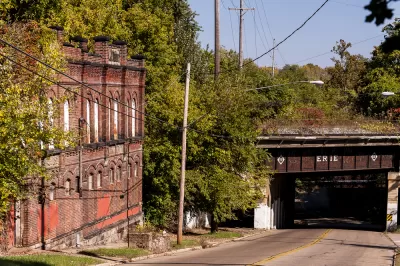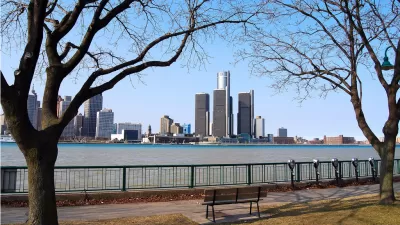Managed decline assumes that struggling cities will continue to struggle indefinitely. Is there a better way to plot neighborhood stabilization?

Jason Segedy, director of planning and urban development in the city of Akron, writes a dissent of the "managed decline" policies that gained traction in Rust Belt cities like Detroit as it struggled with the consequences of a shrinking population.
Segedy acknowledges the argument "that managed decline is a pragmatic approach to present-day economic realities." There is also an argument, adds Segedy, that managed decline is a fatalistic, self-fulfilling prophecy.
Are cities simply hapless victims, subject to the whims of the fates? Or can wise leadership, creativity, and strategic planning create demand to live in a place, and bring about a reversal of fortunes? People who remember Brooklyn in 1977, or East Berlin in 1983, would probably agree that places can change in dramatic and unexpected ways, and that it is sometimes darkest before the dawn.
In fact, argues Segedy, Detroit never actually threw its full bureaucratic weight behind managed decline, and many of its successes now result from embracing the slogan of Mayor Mike Guggan's administration: "Every neighborhood has a future."
To elaborate on the argument against managed decline, Segedy points out a few key areas that offer optimism in Rust Belt cities—and not just Detroit. Opportunities include for new housing, adaptive reuse, and creating incentives for new demand (beyond job creation).
FULL STORY: Housing First: Rejecting Managed Decline in the Rust Belt

Planetizen Federal Action Tracker
A weekly monitor of how Trump’s orders and actions are impacting planners and planning in America.

Restaurant Patios Were a Pandemic Win — Why Were They so Hard to Keep?
Social distancing requirements and changes in travel patterns prompted cities to pilot new uses for street and sidewalk space. Then it got complicated.

Map: Where Senate Republicans Want to Sell Your Public Lands
For public land advocates, the Senate Republicans’ proposal to sell millions of acres of public land in the West is “the biggest fight of their careers.”

Orange County, Florida Adopts Largest US “Sprawl Repair” Code
The ‘Orange Code’ seeks to rectify decades of sprawl-inducing, car-oriented development.

Maui's Vacation Rental Debate Turns Ugly
Verbal attacks, misinformation campaigns and fistfights plague a high-stakes debate to convert thousands of vacation rentals into long-term housing.

San Francisco Suspends Traffic Calming Amidst Record Deaths
Citing “a challenging fiscal landscape,” the city will cease the program on the heels of 42 traffic deaths, including 24 pedestrians.
Urban Design for Planners 1: Software Tools
This six-course series explores essential urban design concepts using open source software and equips planners with the tools they need to participate fully in the urban design process.
Planning for Universal Design
Learn the tools for implementing Universal Design in planning regulations.
Heyer Gruel & Associates PA
JM Goldson LLC
Custer County Colorado
City of Camden Redevelopment Agency
City of Astoria
Transportation Research & Education Center (TREC) at Portland State University
Camden Redevelopment Agency
City of Claremont
Municipality of Princeton (NJ)




























